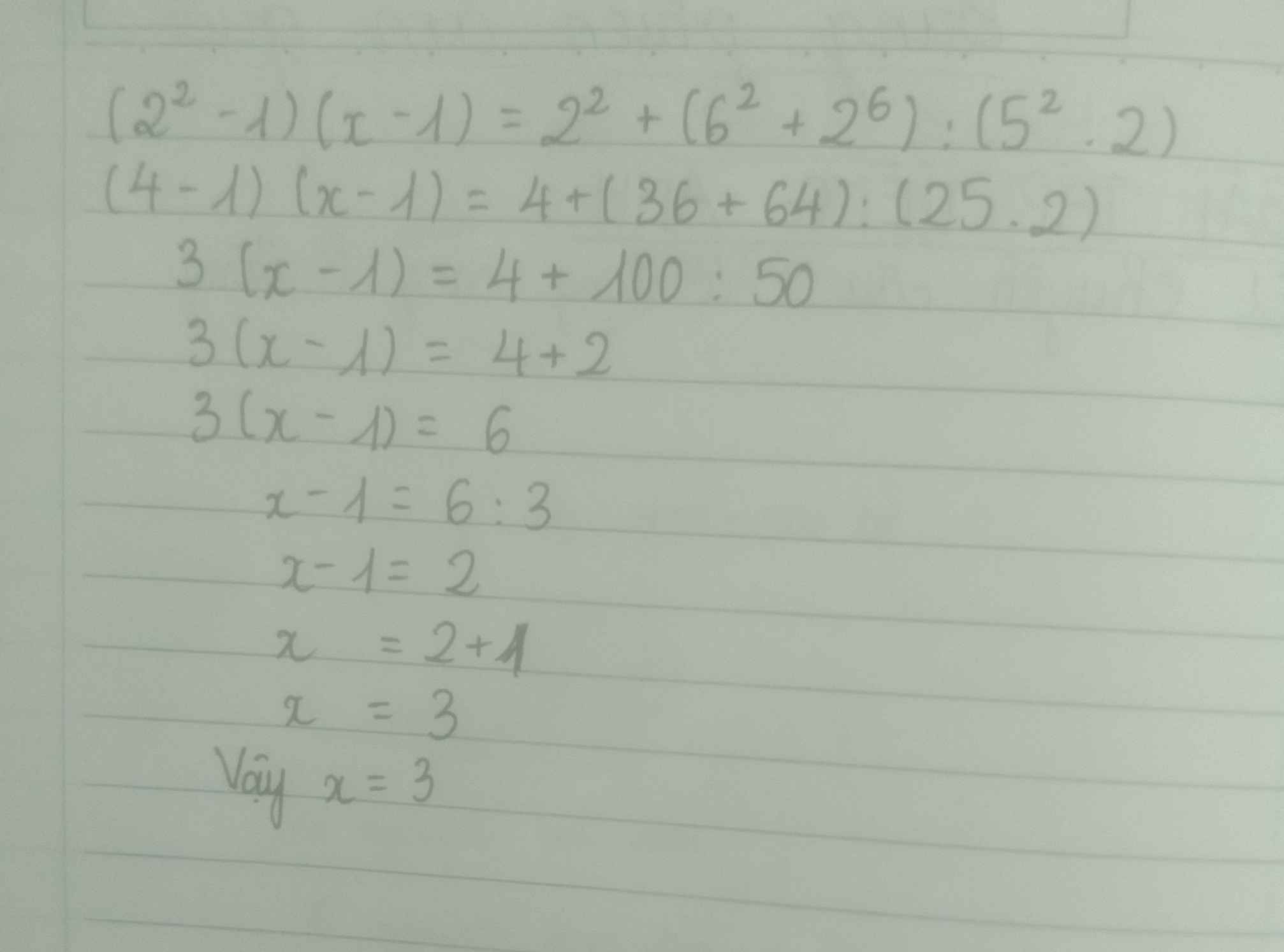Tìm x : 6 x + 1 2 = 2

Những câu hỏi liên quan
1, Tìm x, biết \(x^2\) – 36 = 0
A. x = 6. B. x = -6.
C. x = 6; x = -6. D. x = 36 hoặc x = - 36.
2, Tìm x, biết \(x^3\) – 3\(x^2\) + 3x - 1 = 0
A. x = 1. B. x = -1. C. x = 0. D. x = 2.
tìm x , biết
a) 17/6- x( x-7/6)= 7/4
b) 3/35 - ( 3/5-x)= 2/7
tìm x thuộc Z , biết
3/4-5/6 < x/12 < 1 -( 2/3-1/4)
tìm x biết
a ) 2x-3=x + 1/2
b) 4x- ( x+ 1/2) = 2x - ( 1/2 - 5 )
Bài 1:
a) Ta có: \(\dfrac{17}{6}-x\left(x-\dfrac{7}{6}\right)=\dfrac{7}{4}\)
\(\Leftrightarrow\dfrac{17}{6}-x^2+\dfrac{7}{6}x-\dfrac{7}{4}=0\)
\(\Leftrightarrow-x^2+\dfrac{7}{6}x+\dfrac{13}{12}=0\)
\(\Leftrightarrow-12x^2+14x+13=0\)
\(\Delta=14^2-4\cdot\left(-12\right)\cdot13=196+624=820\)
Vì Δ>0 nên phương trình có hai nghiệm phân biệt là:
\(\left\{{}\begin{matrix}x_1=\dfrac{14-2\sqrt{205}}{-24}=\dfrac{-7+\sqrt{205}}{12}\\x_2=\dfrac{14+2\sqrt{2015}}{-24}=\dfrac{-7-\sqrt{205}}{12}\end{matrix}\right.\)
b) Ta có: \(\dfrac{3}{35}-\left(\dfrac{3}{5}-x\right)=\dfrac{2}{7}\)
\(\Leftrightarrow\dfrac{3}{5}-x=\dfrac{3}{35}-\dfrac{10}{35}=\dfrac{-7}{35}=\dfrac{-1}{5}\)
hay \(x=\dfrac{3}{5}-\dfrac{-1}{5}=\dfrac{3}{5}+\dfrac{1}{5}=\dfrac{4}{5}\)
Đúng 4
Bình luận (0)
Bài 3:
a) Ta có: \(2x-3=x+\dfrac{1}{2}\)
\(\Leftrightarrow2x-x=\dfrac{1}{2}+3\)
\(\Leftrightarrow x=\dfrac{7}{2}\)
b) Ta có: \(4x-\left(x+\dfrac{1}{2}\right)=2x-\left(\dfrac{1}{2}-5\right)\)
\(\Leftrightarrow3x-\dfrac{1}{2}-2x+\dfrac{1}{2}-5=0\)
\(\Leftrightarrow x=5\)
Đúng 0
Bình luận (0)
Cho biểu thức B =(\(\dfrac{x^3}{x^3-4x}+\dfrac{6}{^{6-3x}}+\dfrac{1}{2+x}\)): (x+2+\(\dfrac{10-x^2}{x-2}\))
a) Rút gọn B
b) Tìm B biết x2-5x+6=0
c) Tìm x ∈ Z để B ∈ Z
d) Tìm x biết |B|>1
1. tìm GTNN của A= x(x+2)(x+4)(x+6)+8
2. tìm GTLN của B=5+(1-x)(x+2)(x+3)(x+6)3
3.tìm GTNN của C=(x+3)4 + (x-7)4
4. Cho x>0. Tìm GTNN của P=\(\dfrac{4x^2+1}{2x}\)
1.
$x(x+2)(x+4)(x+6)+8$
$=x(x+6)(x+2)(x+4)+8=(x^2+6x)(x^2+6x+8)+8$
$=a(a+8)+8$ (đặt $x^2+6x=a$)
$=a^2+8a+8=(a+4)^2-8=(x^2+6x+4)^2-8\geq -8$
Vậy $A_{\min}=-8$ khi $x^2+6x+4=0\Leftrightarrow x=-3\pm \sqrt{5}$
Đúng 4
Bình luận (0)
2.
$B=5+(1-x)(x+2)(x+3)(x+6)=5-(x-1)(x+6)(x+2)(x+3)$
$=5-(x^2+5x-6)(x^2+5x+6)$
$=5-[(x^2+5x)^2-6^2]$
$=41-(x^2+5x)^2\leq 41$
Vậy $B_{\max}=41$. Giá trị này đạt tại $x^2+5x=0\Leftrightarrow x=0$ hoặc $x=-5$
Đúng 4
Bình luận (0)
3.
Đặt $x+3=a; 7-x=b$ thì $a+b=10$
$C=a^4+b^4$
Áp dụng BĐT Bunhiacopxky:
$(a^4+b^4)(1+1)\geq (a^2+b^2)^2$
$\Rightarrow C\geq \frac{(a^2+b^2)^2}{2}$
$(a^2+b^2)(1+1)\geq (a+b)^2=100$
$\Rightarrow a^2+b^2\geq 50$
$\Rightarrow C\geq \frac{50^2}{2}=1250$
Vậy $C_{\min}=1250$
Giá trị này đạt tại $a=b=5\Leftrightarrow x=2$
Đúng 1
Bình luận (0)
Xem thêm câu trả lời
tìm x
a,(x+1)^3-(x-1)^3-6(x-1)^2=-10
b,x(x+5)(x-5)-(x+2)(x^2-2x+4)=42
c,(x-2)^3-(x-3)(x^2+3x+9)+6(x+1)^2=49
a) \(\left(x+1\right)^3-\left(x-1\right)^3-6\cdot\left(x-1\right)^2=10\)
\(\Rightarrow x^3+3x^2+3x+1-x^3+3x^2-3x+1-6\cdot\left(x^2-2x+1\right)=10\)
\(\Rightarrow6x^2+2-6x^2+12x-6=10\)
\(\Rightarrow12x-4=10\)
\(\Rightarrow12x=14\)
\(\Rightarrow x=\dfrac{7}{6}\)
b) \(x\left(x+5\right)\left(x-5\right)-\left(x+2\right)\left(x^2-2x+4\right)=42\)
\(\Rightarrow x\left(x^2-25\right)-\left(x^3+8\right)=42\)
\(\Rightarrow x^3-25x-x^3-8=42\)
\(\Rightarrow-25x-8=42\)
\(\Rightarrow-25x=50\)
\(\Rightarrow x=\dfrac{50}{-25}=-2\)
c) \(\left(x-2\right)^3-\left(x-3\right)\left(x^2+3x+9\right)+6\left(x+1\right)^2=49\)
\(\Rightarrow x^3-6x^2+12x-8-\left(x^3-27\right)+6\left(x^2+2x+1\right)=49\)
\(\Rightarrow x^3-6x^2+12x-8-x^3+27+6x^2+12x+6=49\)
\(\Rightarrow24x+25=49\)
\(\Rightarrow24x=24\)
\(\Rightarrow x=\dfrac{24}{24}=1\)
Đúng 1
Bình luận (0)
2*x+1/2*x + 6*x+1/6*x +12*x+1/12*x +20*x+1/20*x= 5.tìm x
tìm x ( 2^2 *- 1 ) ( x - 1 ) = 2^2 + ( 6^2 + 2^6 ) : ( 5^2 * 2 )
Tìm x ( 2^2 - 1 ) ( x - 1 ) = 2^2 + ( 6^2 + 2^6 ) : ( 5^2 * 2 )
Ta có: \(\left(2^2-1\right)\left(x-1\right)=2^2+\left(6^2+2^6\right):\left(5^2\cdot2\right)\)
\(\Leftrightarrow3\left(x-1\right)=4+2=6\)
\(\Leftrightarrow x-1=2\)
hay x=3
Đúng 0
Bình luận (0)
x+1/x^2+x+1-x-1/x^2-x+1=2(x+2)^2/x^6
tìm x
Tìm x: 6(x+2)(x-3) - 3(x-2)^2 - 3(x-1)(x+1)=1
\(\Leftrightarrow6\left(x^2-x-6\right)-3\left(x^2-4x+4\right)-3\left(x^2-1\right)=1\)
\(\Leftrightarrow6x^2-6x-36-3x^2+12x-12-3x^2+3=1\)
\(\Leftrightarrow6x=46\)
hay x=23/3
Đúng 0
Bình luận (0)




















